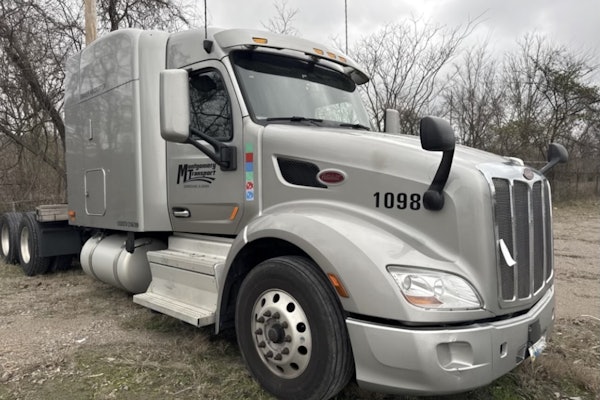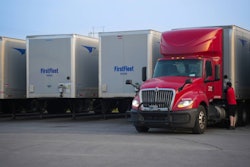Tom Whaley (left) serves as president of both Metro Express and Level One Technologies. Jason Kirkpatrick, now operations manager at Level One, led the initial software development.
In the late 1990s, Metro Express recognized that it had outgrown its information systems. The St. Louis-based carrier had evolved from a local expedited delivery carrier founded in 1988 into an operation that was involved heavily in third-party logistics as well as expedited delivery.
Typical trucking software didn’t satisfy the carrier’s requirements, but available logistics software packages were far more complex and expensive than Metro Express needed. What the carrier wanted was a Web-based system primarily designed for third-party dispatch.
Finding nothing that fit the bill, the owners of Metro Express investigated the idea of building their own solution. It was a bold notion for a small company that had no programmers on staff. But what Metro Express did have was creativity.
President Tom Whaley credits in particular Jason Kirkpatrick, who was a Metro Express manager known for creativity and insight. Kirkpatrick believed that the software development could be commercialized to offset the carrier’s costs, and he became the point person on the project.
Whaley and Kirkpatrick hired programmers on a contract basis to write software that met the needs of Metro Express. After about two years of development, the owners of Metro Express officially launched Freightlist.com as a separate venture in May 2000. The goal of Freightlist.com was to provide the features of software-based logistics management programs with the functionality of Internet-based freight and truck posting services.
Setting a new course
Whaley and Kirkpatrick hit the road to promote Freightlist.com, attending about 15 trucking and logistics trade shows. Out of discussions with many prospects in all types of transportation businesses, they recognized a greater commercial potential in another type of solution.
“Many people approached us at trade shows saying that what they were looking for was a way to pay drivers and carriers more efficiently,” Whaley says. “We began to explore the possibility of an online payment system.”
Whaley saw the potential for the same win-win scenario Metro Express had experienced with Freightlist.com. The system would be built to meet the needs of Metro Express to pay carriers it does business with as well as its own drivers. And the system would be commercialized, helping to amortize development costs through other users.
So in late 2000, Freightlist.com and Metro Express began working together on an online payment system. After about 18 months of development and beta testing, Metro Express in April 2002 began using the system, called Epay Manager.
The financial advantages of Epay Manager lie in reducing the cost of payment transactions and shortening the time between billing and collection, Whaley says. The costs associated with a paper-based payables process, including postage and overnight shipment of checks, can run from $4 or $5 to $28, he says. For a carrier, it could cost about $15 to collect an invoice. The system helps free up staff time for other tasks because it automates many payables activities that can take considerable time when done manually, Whaley says.
Epay Manager has been upgraded several times since its initial release. For example, the system now allows carriers to offer discounts on transportation charges in exchange for faster payment. The company also is discussing interfaces with other management system and accounting packages. There already is integration with Peachtree and Quickbooks.
Recently, Metro Express began using Epay Manager for driver settlement. The system goes beyond just a direct deposit of a check to include online settlement details. In addition to saving money over a paper process, it has been a boost to productivity, Whaley says. “Drivers don’t have to waste a day dealing with settlement.” As with previous developments, Metro Express tested and used the driver settlement feature extensively to ensure it was ready to roll out to commercial users.
Epay Manager has become the focus of software development, and earlier this year Freightlist.com changed its name to Level One Technologies to acknowledge the company’s evolution from marketing a single product to one that produces more diversified software, including Epay Manager and document imaging software. Following use of Epay Manager in transportation, Level One may look at other industries, such as manufacturing. That would require some reprogramming as Epay Manager is based on terms and requirements specific to transportation.
Although Level One Technologies is committed to supporting Freightlist.com for existing customers, Metro Express no longer uses it. Several years ago, Metro Express saw that its local expedited market was declining, so now it is focusing on broader opportunities in expedited transportation, such as for the automotive industry.
During the 1990s, the carrier’s equipment was mostly for local pickup and delivery. Larger units were provided by carriers and owner-operators through its third-party operation. Although Metro Express still operates straight trucks in local and on-highway operations, about half of its units are tractor-trailer combinations, and that’s the segment that’s growing. Freightlist.com simply wasn’t adequate for this type of operation, Whaley says.
Separate but connected
Once the owners of Metro Express decided to get into the software business, they recognized the need to operate the two companies separately. Whaley is president of both Metro Express and Level One Technologies, and the two companies are housed in the same building. But Level One maintains separate financial records, employees and corporate structure. And Level One’s customer information is not shared with Metro Express.
The clear separation is important because the Web-based software requires the handling of sensitive information for companies that may compete with Metro Express. “We are upfront as to who we are, but we assure companies that there is no ‘hanky-panky’ between the two companies,” Whaley says.
At the same time, Whaley acknowledges that the architecture of both Freightlist.com and Epay Manager grew out of the needs and experience of Metro Express personnel. Metro Express remains Level One’s principal test bed, which helps both companies achieve their goals more quickly.
“The symbiotic relationship is essential,” Whaley says. “You can’t develop something like this without a customer that’s willing to suffer with you.” Joint ownership ensures, for example, that the carrier won’t abandon a tedious development process out of frustration.
At the same time, the investment in a system like Epay Manager, which has cost about $4 million to develop, would be prohibitive for a carrier the size of Metro Express without the potential for commercialization, Whaley says. “We never would have done it.”
Innovators profiles carriers and fleets that have found innovative ways to overcome trucking’s challenges.
If you know a carrier that has displayed innovation, contact Avery Vise at [email protected] or (800) 633-5953.






